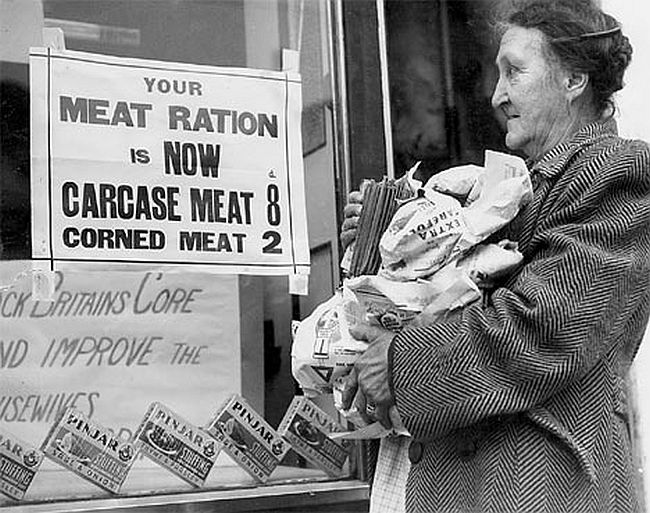"I would kill for a cheeseburger. Honestly. If I stumbled across someone eating a cheeseburger, I would kill them for it." - The 5th Wave
 |
https://www.deviantart.com/
adamrabalais/art/Cinematic-Psychopaths-
A-Clockwork-Orange-517574306 |
Throughout the lifespan of WWII and the nine years of continued rationing that followed, every Brit probably had the same thought as Cassie from
The 5th Wave. It was a time before delicious conveniences such as Angels Delight or 'fast food' and it was the era that the writer of
A Clockwork Orange, John Burgess grew up in. I believe Burgess' personal experiences with food heavily influenced it's representation within his 1962 dystopia, as well as helping to deepen his future English society by providing an insight into its politics.
 |
Rationing in Post WWII England
https://www.bruceonpolitics.com/
2015/02/17/attlee-starved-british-people/ |
Food makes its first appearance in the novel during the Droogs only successful 'old surprise visit' in chapter two. While Alex and Dim are inspecting the manuscript 'A Clockwork Orange', 'Georgie and Pete came in from the kitchen... Georgie with like a cold leg of something in one rooker and half a loaf of kleb with a big dollop of maslo on it in the other, and Pete with a bottle of beer frothing it's gulliver off and a horrorshow rookerful of like plum cake.' (28) Both boys beeline immediately for the kitchen when they break into the house; food is at the forefronts of their minds, before sex and violence which suggests the extent of their hunger. This scene probably presents itself to most readers as an emphasised manifestation of the youths greed however, when compared with the description of the dinner prepared for the protagonist Alex at home, it is clear both scenes may have a deeper significance. '... mum had laid out on the table my malenky bit of supper - a couple of lomticks of tinned spongemeat with a shive or so of kleb and butter, a glass of the old cold moloko.' (38) The opposing use of the Nadsat language in these scenes is immediately apparent, with Alex describing the amount of food Georgie and Pete took as 'rookerful' meaning they either had an arm or handful opposed to Alex's 'malenky' bit of supper which translates to mean he had little to eat. The upper-class owners of the house which the gang invade have an entire loaf of bread and legs of meat whereas at home for dinner Alex is provided with a mere slice of bread and tinned 'spongemeat' as he describes. The dissimilarity between the quantity and quality of food that the different households retain highlights an issue with social class within the world; Alex's family live on tinned meats, bread and milk whereas, the richer members of the civilisation feast on animal limbs and alcohol. This heavily resembles the history of rationing in Britain and represents key political issues within the utilitarian society Burgess is creating.
 |
Alex's Far From British Supper
https://www.youtube.com/watch?v=3cZ2BUyLgUk |
Comparatively, the 1971 film adaption lacks many of the original food scenes from the novel. One of the only two scenes depicting Alex eating is severely Americanised, with the chai tea, eggs, ham and sausages the wealthy writer cooks for him being replaced with red wine and spaghetti. This not only erases the context behind the food in the novel but in my opinion, renders food within the film a meaningless aside similar to that of earlier dystopian novels like
We.
The novel on the other hand, successfully uses food to strengthen the dystopia; by contrasting Alex's meals with that of the wealthy homeowners he and his Droogs insist on harassing, Burgess highlights the issues with politics and social class in England at the time the text was written as well as within the fictional England he constructed.
Bibliography
Burgess, Anthony.
A Clockwork Orange. London: Penguin Classics, 2013. Print.
Yancey, Rick.
The 5th Wave. London: Penguin, 2013. Print.



What I love about this post is how you use a quote from the studied book as the title before putting the quote in full context, thus perfectly setting up the post. I also like how you explored the difference between the book version of "A Clockwork Orange" and its film adaptation, which helps to further the discussion on food in literature and in dystopian texts. :)
ReplyDelete